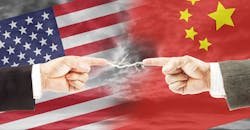US-China Talks Said to Have Stalled on High-Tech Industry
Trade talks between the world’s biggest economies broke down last week after the Trump administration demanded that China curtail support for high-technology industries, a person familiar with the situation said, signaling that a resolution may be some ways off.
Liu He, a vice premier overseeing economics and finance, told a group of officials Thursday that Beijing had rejected a U.S. request to stop subsidizing industries related to its “Made in China 2025” initiative, the person said. The U.S. has accused China of using the policy to force companies into transferring technology in areas like robotics, aerospace and artificial intelligence.
The U.S. demands came after Beijing offered to narrow the trade deficit by $50 billion, including by importing more liquefied natural gas, agricultural products, semiconductors and luxury goods, according to the person. The plans also included opening the financial sector at a faster rate and giving U.S. companies more access to China’s booming e-commerce market, the person added.
Liu said President Xi Jinping was ready to fight back hard if U.S. counterpart Donald Trump wanted a trade war, said the person, who asked for anonymity to speak about confidential discussions. China was open to talks with the U.S., but wouldn’t initiate them under the current conditions, the person said, citing Liu.
The dust-up suggests that the trade dispute won’t be resolved quickly, despite Trump’s optimistic tweets and Xi’s conciliatory address to a regional economic forum Tuesday. In recent days, Chinese officials have expressed increased frustration with the U.S., with the foreign ministry on Monday calling talks “impossible” under current conditions.
A senior White House trade adviser on Tuesday said the U.S. is moving in a “measured” way through the process of evaluating whether to follow through with the tariffs on Chinese products. The tariffs proposal is still in a 60-day period for public input and the U.S. Treasury is preparing recommended curbs on Chinese investment due by late May.
“There are doors to discussions, and we are having those,” Peter Navarro, White House director of trade and industrial policy, said in an interview with National Public Radio. The U.S. wants a rebalancing of trade flows between the two countries, and for China to stop “stealing” American intellectual property, he said.
On Monday, Trump signaled that a deal with China was within reach, saying his administration would “probably” resolve a dispute that has roiled financial markets and raised fears of a major clash between the world’s biggest economies. Xi’s speech Tuesday lifted stocks in Asia and U.S. equity futures.
China’s Xi Pledges Greater Openness Amid Trump Trade Dispute
Xi pledged a “new phase of opening up” in his keynote address Tuesday to the Boao Forum for Asia. He reiterated plans to allow more foreign participation in sectors like automobile manufacturing and banking, and said China would strengthen measures to protect intellectual property rights.
Trump praised Xi’s “kind words on tariffs and automobile barriers” on Tuesday. “Also, his enlightenment on intellectual property and technology transfers. We will make great progress together!,” Trump said on Twitter.
Xi also called on countries to export high-technology goods to China, which has been a point of contention with the U.S. A commentary in the official People’s Daily after the speech said Beijing would never open at the expense of its interests -- a signal that it would continue supporting “Made in China 2025.”
Technology Transfer
Trump’s administration was unified in the view that U.S. jobs were endangered by what it called China’s forced technology transfers and state-directed intellectual property theft, according to a White House official who watched Xi’s speech.
The State Council Information Office, which represents China’s central government, didn’t reply to faxed questions Monday on U.S. trade talks. The White House had no comment on specifics of the discussions, but an administration official said China should change its behavior and take action to change the trajectory of its trading relationship with the U.S.
What our economists say...
“The U.S. side will likely want to see deeds, not just words, before it considers softening its protectionist stance,” Bloomberg Economics Chief Asia Economist Tom Orlik wrote in a note. “Even so, with Xi’s speech positioning China as conciliatory, the chances of a damaging trade war appear a shade lower.”The remarks by Liu -- who visited Washington in February and is taking the lead on the government’s response to Trump’s trade moves -- suggest the dispute won’t be resolved easily. The meeting was held before Trump instructed officials to consider tariffs on an additional $100 billion in Chinese imports, bringing the value of the nation’s products set for higher duties to about $150 billion. The U.S.’s bilateral trade deficit was $375 billion last year.
‘Big Stick’
China vowed a harsh response to Trump’s latest threat, helping to spur a selloff that prompted the S&P 500 Index to fall 2.2 percent last Friday. Geng Shuang, a foreign ministry spokesman, said Monday that it was “even more impossible” for trade talks to take place under the current environment.
“This trade conflict was initiated by the U.S. alone and it is entirely the one to blame,” he said. “The U.S. is wielding the big stick of trade sanctions while keeping saying they are willing to talk. I am not sure who the U.S. is putting on such acts for.”
China is considering offering major concessions on trade and investment to the European Union and countries such as Japan and Mexico, the person said.
In his remarks, Xi sought to calm any U.S. fears that China aimed to challenge its supremacy. Trump’s administration last year labeled both China and Russia “rival powers.”
“Regardless of the extent of development, China will not subvert the current international system, nor will it seek to establish spheres of influence,” Xi said. “China has always been a builder of world peace, a contributor to global development, and a defender of the international order.”
by Keith Zhai
